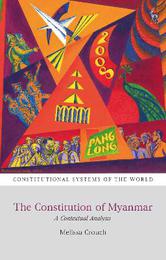
|
The Constitution of Myanmar: A Contextual Analysis
Paperback / softback
Main Details
| Title |
The Constitution of Myanmar: A Contextual Analysis
|
| Authors and Contributors |
By (author) Dr Melissa Crouch
|
| Series | Constitutional Systems of the World |
|---|
| Physical Properties |
| Format:Paperback / softback | | Pages:276 | | Dimensions(mm): Height 216,Width 138 |
|
| ISBN/Barcode |
9781509933143
|
| Classifications | Dewey:342.59102 |
|---|
| Audience | | Professional & Vocational | |
|---|
|
Publishing Details |
| Publisher |
Bloomsbury Publishing PLC
|
| Imprint |
Hart Publishing
|
| Publication Date |
7 May 2020 |
| Publication Country |
United Kingdom
|
Description
This timely and accessible book is the first to provide a thorough analysis of the 2008 Constitution of Myanmar (Burma) in its historical, political and social context. The book identifies and articulates the principles of the Constitution through an in-depth analysis of legal and political processes and practises, particularly since the 1990s. The core argument of this book is that the 2008 Constitution is crucial to the establishment and maintenance of the military-state. The military-state promotes the leadership role of the military in governance based on a set of ideological commitments and a centralised form of organisation based on the concept of the Union. The book develops this argument by demonstrating how the process of constitution-making and the substance of the 2008 Constitution contribute to its lack of credibility and fuel demands for reform. The vision offered by the 2008 Constitution and its associated institutions has been the subject of fierce contestation, not least, for example, due to concerns over the militarisation of the state. This book is animated by debates over fundamental ideas such as the nature of democracy, the possibility of peace and federalism, the relationship between the executive and the legislature, relations between the Union government and sub-national governments, debates over judicial independence and the oversized role of the Tatmadaw (armed forces). Central to the future of the Constitution and the military-state is the role of the Tatmadaw, which will be a key determinant in any potential shift from the present highly centralised, partly-democratic Union to a federal or decentralised democratic system of governance.
Author Biography
Melissa Crouch is Associate Professor in Law at the University of New South Wales.
ReviewsThe Constitution of Myanmar provides a meticulous positive analysis of constitutional praxis in contemporary Myanmar and is an essential new source on authoritarian constitutionalism. -- Maryam S Khan, Institute of Development and Economic Alternatives * Law & Society Review * Dr Crouch's book is a remarkable exploration of the emerging constitutional order of Myanmar - deeply knowledgeable about Myanmar's constitutional history, conscious of the profound divisions within Myanmar and the consequent array of demands made upon that order, and acute in its interpretations of a constitution undergoing rapid change. This book will be of great interest to those wishing to understand law and government in Myanmar, but also those interested generally in transitions from military rule, the governance of ethnically diverse societies, and the transition from colonial to post-colonial political orders. -- Professor Jeremy Webber, University of Victoria This is a welcome and timely new contribution to the excellent Hart series. It offers a well-informed analysis of the current constitutional arrangements in Myanmar, at a time when proposals for change are once again under discussion. The book will be an invaluable resource for those interested in Myanmar, Asian constitutional systems and multi-level government in times of transition. -- Professor Cheryl Saunders, University of Melbourne Myanmar's Constitution was not expected to matter much when it was adopted in 2008, but Professor Crouch demonstrates that it has produced a vigorous set of debates about the country's trajectory. This is the definitive English-language volume on Myanmar's Constitution and essential for anyone following the country. -- Professor Tom Ginsburg, University of Chicago
|